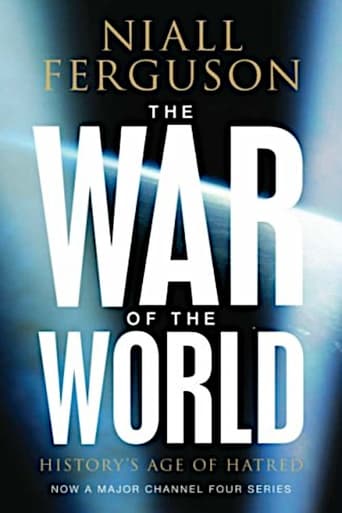

A critical debate between Pankaj Mishra and the author is extremely illuminating: www.lrb.co.uk/v33/n21/pankaj-mishra/watch-this-manWhether the author is a classical Charles Oman's vulgarisateur or a la Ann Coulter from across the ocean is for the viewer to decide!Were you to lament the former glory of British Empire with instinctive patriotic zeal and wistful for its positive accomplishments, then this is a movie you will appreciate. Were you to instinctively demonize British Empire, then you likely will feel insulted over and over through this movie. The academic debate on the role of Colonial Empires is much more balanced with careful assessment of incidental benefits that rule brought and negative consequences that exploitation brought.It is unfortunately full of outright erroneous emotive pabulum steeped in old stereotypes. Ascribing white supremacist views to Russian elites in pre-WW1 days, is a classical Jungian externalization of eugenics enamored British tendencies of those days. Russia was afflicted with messianic zeal. But the famous and shameful "burden of white man" was substituted with equally questionable "defender of Orthodox faith" and "Third Rome" rhetoric, hence supra-ethnic definition of Russian nation as any Orthodox Christian living within borders of Russian Empire.In short, it is a good and entertaining product from the self-proclaimed champion of counterfactual history. Just as one allows for creative freedom in fiction movies for the sake of production's amusement value, this movie deserves no less.
... View MoreFor those who don't know, Niall Ferguson is a Western Russophobic propagandist. Just take a look at his body of work. In everything that he wrote he praised capitalism and the Western way of life. He is, of course, praised and promoted by Western propagandist publications. Russia and Communism aren't the only things he dislikes. He pretty much smears anything that's not Western. Like other Western authors these days he's trying to falsify history. One of their top objectives is the falsification of Russian history of the 20th century. That's right, the Soviet period. Don't believe me? Do some real research and find out for yourself. Russian philosopher Aleksandr Zinovyev already wrote about such people and about what's going on with Western society. If you've been told to hate and distrust Russians then turn to books by honest Western historians like Fernand Braudel or Carroll Quigley.So what's really going on with the West? Obviously what Ferguson is saying is useless. Western Civilization is currently in the Age of Conflict, a bad period. It seems that the United States will become, or is already becoming, the universal empire of the West. Some may think that this is cool but it's not. The age of the universal empire is the last period in a civilization's life. After that it decays and then gets invaded by outsiders. It's a period when people's belief in their culture declines. This is what happened to the Roman Empire, the universal empire of Classical Civilization. The reason why the West dominates the world is because Western Civilization is the most powerful in history. But, like I said, it's also close to death. This is why Western culture is getting worse and worse, why the West is waging imperialist wars, and why the economic situation is bad. The rulers of the West are resorting to methods which aren't normal because the instrument of expansion, Industrial Capitalism, has become a structure of vested interests called Monopoly Capitalism. And Ferguson is actually praising this rotten system. He gets a paycheck from his masters by writing and producing bull, but I think that the average person needs to know what's really going on.
... View MoreI'm only about half way through this thoughtful and candid history of wars -- both hot and cold -- in the last century, so I might edit some of this later. Right now, Niall Ferguson's take on the causes of war strike me as fairly original. I don't see much of "the same old thing" that some others have remarked upon, except of course that, in describing these world conflicts some of the same newsreel footage is used.It's odd because, judging from Ferguson's background in economic history, one would imagine him to be a materialist. Instead, the argument he seems to be pushing in this documentary is that one of the more important features of waging war is not so much economics as ethnocentrism -- a sense of "us" against "them", with "them" being infinitely inferior to "us" and worthy of deportation or extermination.Well, there's no question that a sense of what Emile Durkheim called "mechanical solidarity" is important in warfare. During the Battle of the Crater in the American Civil War, frenzied white Union troops trapped in a maze of trenches and craters turned their bayonets on their African-American comrades in arms. The colored troops were on our side but they weren't enough like "us." In America today there are those who believe the president is not enough like the rest of "us" either.That sense of ethnic and racial allegiance seems to be deeply rooted in human nature. (If we want to get rid of it, maybe we should start looking for an antidote to testosterone.) But sometimes I get the feeling that, in giving us a history of the ethnic and racial aspects of war, Ferguson may put the cart before the horse. I guess I'm more of a materialist than he is because there are times when he seems to be mixing up the independent and dependent variables, cause and effect. The demonization of the enemy, it seems to me, is more likely to follow than to precede the definition of the enemy.You've got to know who to demonize before you can do the deed. And you define the enemy because they have something you want and you believe you can get it by conquering them. THEN you demonize them.No one is likely to say, "Those rag head bastards have all this oil and we need it. Let's invade their country, kill everybody, and steal their oil." You can substitute "mangoes" for "oil" if that's bothersome.That doesn't explain Hitler's treatment of the Jews in Europe very well, which seems to have been a convenient drum beat designed to stir up sufficient hatred among the Volk to get them to march together. But it seems to have had more of a bearing on the Japanese treatment of the peoples of Asia -- the Chinese, the Fillipinos, and the Maylasians. Asia had oil and natural resources like tin that the Japanese were desperate to get.But who knows? Ferguson HAS taken material considerations into account. And, after all, who can explain all the motives behind a single homicide, let alone a War of the World.
... View MoreThe War of the World by Professor Niall Ferguson is touted as a radically different perspective on the wars of the last century. In fact this diatribe has a tendency to state the obvious.One word is used often, Inhuman. This word suggests that cruel violence is contrary to human behaviour but in fact human beings have consistently shown through out history a prevalence for violence rather than any other characteristic. It is interesting to see that after some time has passed conspiracy can be legitimately entered into historical record such as the false flag operations of the Japanese against the Chinese or the general acceptance that Pearl Harbor was not the surprise attack it was publicised to be. Professor Niall Ferguson is ready to believe acts of state sponsored terrorism but remarkably supports the crazed lone gunman theory when talking about the assassination of JFK.For a more rewarding documentary on war, ideology and human behaviour I would recommend the "The Power of Nightmares: The Rise of the Politics of Fear" (2004) by Adam Curtis.
... View More